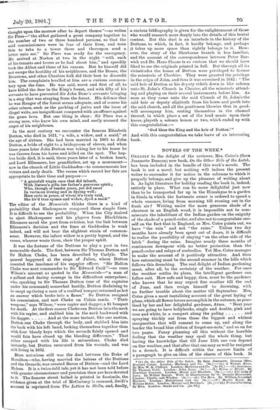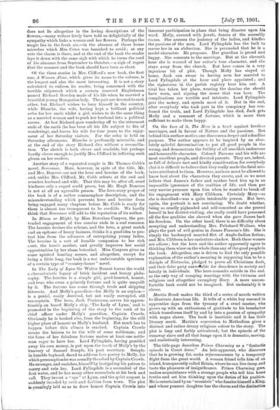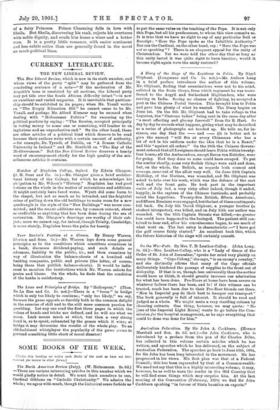NOVELS OF THE WEEK.*
GREATLY to the delight of the reviewer, Mrs. Cotes's (Sara Jeannette Duncan) new book, On the Other Side of the Latch, has been included in the bundle of this week's novels. The book is not a novel, but nothing will induce the present writer to surrender it for notice in the columns to which it properly belongs, and give up the pleasure of writing about it. As light literature for holiday reading the book is, indeed, entirely in place. What can be more delightful just now than to be transported far up in the Himalayas to a garden in Simla in which the fortunate owner is ordered to spend a whole summer, living from morning till evening out in the fresh air ? Writing under the more generous shade of a chestnut in an English wood, it is impossible not to com- miserate the inhabitant of the Indian garden on the exiguity of the shade of a pencil-cedar, and also not to congratulate one- self on the fact that in England, as Mrs. Cotes points out, we have "the rain" and not "the rains." Unless two dry months have already been spent out of doors, it is difficult to realise the possibility of staying "on the other side of the latch" during the rains. Imagine nearly three months of continuous downpour with no better protection than the pencil-cedar and relays of umbrellas. Yet Mrs. Cotes manages to make the account of it positively attractive. And then how entrancing must be the second summer in the hills which follows this drenching. The real delight of Indian gardening must, after all, be the certainty of the weather. For once the weather settles its plans, the intelligent gardener can follow suit. How safe and happy, then, must be the gardener who knows that he may expect fine weather till the end of June, and then resign himself to drowning, with no further trouble about the matter till September. Mrs, Cotes gives a most tantalising account of the great laying of plans, which all flower lovers accomplish in the autumn, as prac- tised by her and her delightful gardener, Atma. "Next year we are going to have hollyhocks, single and double, pink and
rose and white, in a rampart along the paling and spraying thickly out from these the biggest and whitest marguerites that will consent to come up, and along the border the broad blue ribbon of forget-me-note," and so on for two pages. Fancy planning all this without the horrible feeling that the weather may spoil the whole thing, but having the knowledge that till June 15th one can depend on fine weather, and that after that one may as well be resigned to a drench. It is difficult within the narrow limits of a paragraph to give an idea of the charm of this book. It
• (1.) On the Other Side of the Latch. By Sara Jeannette Duncan (Mrs. Everard (otes). London : Methuen and Co. [8s.]—(2.) A Woman Alone. By Mrs. W. K. Clifford. London : Methuen and Co. [3s. 6d.]—(3.) Severance. By Thomas Cobb. London John Lane. [6s.3—(4.) Bloom or Blight. By Dorothea Conyers. London : Hurst and Blacken. [038.]—(3.) The Lady of Lynn. By Walter Besant. With 12 Illustrations by G. Demain-Hrumuond. London : Clunto and Windus. [Gs.]—(6.) The Hero. By William Somerset Mayhew. London : Hutchinson and Co. [6s.1—(7.) Martin Brook. By Morgan Bates. London Harper and Brothers. j6s.:1--(13.) Prince Charming. By Rita. London : Sands and Co. [da. 6d.]
does not lie altogether in the loving descriptions of the flowers,—many writers lately have told us delightfully of the sympathy which links a woman and her flowers. Perhaps the magic lies in the fresh air,—in the absence of those house microbes which Mrs. Cotes was banished to avoid ; at any rate the charm is there, and at the end of the book the reader lays it down with the same sigh with which he turns the card of his almanac from September to October,—a sigh of regret that the summer and the book should have been so short.
Of the three stories in Mrs. Clifford's new book, the first one, A Waman Alone, which gives its name to the volume, is the longest and also the most interesting. It is not a story calculated to enliven its reader, being concerned with the terrible shipwreck which a certain reserved Englishman named Richard Bowden made of his life when he married a beautiful young Hungarian lady. The pair are devoted to each other, but Richard wishes to bury himself in the country, while Blanche, the wife, having kept a brilliant political salon for her uncle whilst a girl, wishes to do the same thing as a married woman and to push her husband into a political career. At last Richard goes wandering off to the uttermost ends of the earth (he has been all his life subject to fits of wandering), and leaves his wife for four years to the enjoy- ment of her Saturday visitors. For the salon is held on Saturday afternoons. Blanche is profoundly miserable, and at the end of the story Richard dies- without a reconcilia- tion. The sketch is both clever and readable, but perhaps hardly clever enough to justify Mrs. Clifford in inflicting such gloom on her readers.
Another story of a separated couple is Mr. Thomas Cobb's novel, Severance. Here, however, in spite of the title, Mr. and Mrs. Danvers are not the hero and heroine of the book, and, unlike Mrs. Clifford, Mr. Cobb relents at the end and . reunites husband and wife. That this may be, after all, cruel kindness only a sequel could prove, but Mr. Hugh Danvers is not at all an agreeable person. The love-story proper of the book is of a rather commonplace description, and the misunderstanding which prevents hero and heroine from being engaged many chapters before Mr. Cobb is ready for them is almost too transparent to be credible. We hardly think that Severance will add to the reputation of its author.
In Bloom or Blight, by Miss Dorothea Conyers, the pre. tended engagement of two cousins ends in a real romance. The heroine devises the scheme, and the hero, a great match and an epitome of heavy laziness, thinks it a good idea to pro- tect him from the advances of enterprising young ladies. The heroine is a sort of humble companion to her rich aunt, the hero's mother, and greatly improves her social opportunities by her sham betrothaL Miss Conyers gives us some spirited hunting scenes, and altogether, except for being a little long, the book is a not unfavourable specimen of a certain type of " country-house " novel.
In The Lady of Lynn Sir Walter Besant leaves the world a characteristic legacy of brisk incident and breezy philo- sophy. The heroine is a simple girl, good-hearted, honest, and true, who owns a princely fortune and is quite unspoilt by it. The fortune has come through trade and shipping interests. And Molly's guardian—for Molly is an orphan— is a genial, easily deceived, but not easily corrupted, old sea-captain. The hero, Jack Pentecross, serves his appren- ticeship on board Molly's ship, The Lady of Lynn,' and is promoted in the beginning of the story to the rank of its chief officer under Molly's guardian, Captain Crowle. Obviously he is booked also, from the beginning, for the still higher place of honour as Molly's husband. But much has to happen before this climax is reached. Captain Crowle means the heiress to be the wife of some nobleman; and the fame of her fabulous fortune makes at least one noble- man eager to have her. Lord Fyl ingdale, having gambled away his own money, is put upon the track of Molly's by the knavery of Samuel Semple, his poet secretary. Semple, in humble boyhood, dared to address love poetry to Molly, for which presumption he was soundly thrashed by Captain Crowle. He revenges, and enriches, himself by instigating his patron to marry and ruin her. Lord Fylingdale is a scoundrel of the first water, and he has many other scoundrels at his beck and call. They invent a 'spa" at Lynn, and the quiet seaport is suddenly invaded by rank and fashion from town. The plot is cunningly laid so as to draw honest Captain Crowle into
innocent participation in plans that bring disaster upon his ward. Molly, covered with jewels, dances at the assembly rooms. She arouses the jealousy of the ladies, and kindles the passions of the men. Lord Fylingdale has the luck to rescue her in an abduction. She is persuaded that he is a model character. He proposes. Her guardian is proud and happy. She consents to the marriage. But at the eleventh hour she is warned of her suitor's true character, and she stays away from the church. But here comes in a very ingenious bit of plot.. Though Molly has stayed at home, Jack can swear to having seen her married to Lord Fylingdale at the hour and place appointed ; and the signatures iii the parish registry bear him out. A rival has taken her place, wearing the domino she should have worn, and signing the name that was hers. The complications are terrible and intricate. Lord Fylingdale gets the motley, and spends most of it. But in the end, after everybody who took part in the conspiracy has con- fessed the truth, and Lord Fylingdale has died, Jack gets Molly and a remnant of fortune, which is more than sufficient to make them happy.
On the face of it, The Hero is a tract against loveless marriages, and in favour of Nature and the passions. But behind this surface motive, one discovers a deeper and a deadlier purpose. The author appears to be inspired by an abso- lutely spiteful determination to put all good people in the wrong, and demonstrate the futility of all unselfish endeavour and honourable character. Colonel Parsons and his wife are most excellent people, and devoted parents. They are, indeed, so full of delicate tact and kindly consideration for everybody that it is difficult to believe that they really made the fatal mis- takes attributed to them. However, authors must be allowed to know best about the characters they create, and so we must believe that James's father and mother bred him up in an impossible ignorance of the realities of life, and then put very unwise pressure upon him when he wanted to break off his engagement with Mary Clibborn. Certainly Mary—as she is described—was a quite intolerable person. But here, again, the portrait is not convincing. We doubt whether, being so cruelly pigheaded and self-conceited as she proved herself in her district-visiting, she really could have possessed all the fine qualities she showed when she gave James back his freedom. On the other hand, there is no difficulty about accepting and understanding Mrs. Pritchard-Wallace, who plays the part of evil genius in James Pamons's life. She is simply the hackneyed married flirt of Anglo-Indian fiction; and Mrs. Clibborn is her caricature shadow. Both these women are odious ; but the hero and the author apparently agree in thinking them wiser on the whole than any of the good people in the book. Altogether, one is driven to find the only possible explanation of the author's meaning in supposing him to be a disciple of Nietzsche, pledged to prove all Christians fools, and their false piety answegable for decadence in society and fatuity in individuals. The hero commits suicide in the end, as the only way of escaping marriage with the virtuous and religions and altogether exemplary Mary. A more uncom- fortable book could not be imagined. But undeniably it is clever.
Martin Brook makes the third of a series of novels written to illustrate American life. It tells of a white boy rescued in apprentice days from the tyranny of a cruel master, who grows up with an enthusiasm of gratitude to his benefactor which transforms itself by and by into a passion of sympathy with negro slaves. The book is inartistic. and it has little literary merit. Martin's conversion to Methodism gives a distinct and rather dreary religions colour to the story. The plot is limp and feebly articulated; but the episode of the runaway slave and all that hangs upon it is dramatic, moving, and realistically interesting.
The title-page describes Prince Charming as a " fantastio episode in Court dress." An heir-apparent, who discovers that he is growing fat, seeks rejuvenescence by a temporal/ flight from the great world. A woman friend tells him of an island, transparently called Erinia, where he can live incog. and taste the pleasures of insignificance. Prince Charming goes, makes acquaintance with a strange people who tell him home truths and set him thinking upon the duties of his position. He is entertained by an "eccentric" who fancies himself a King, and whose peasant daughter has the charm and the distinction of a fairy Princess. Prince Charming falls in love with Sheila. But Sheila, discovering his rank, rejects his overtures with noble dignity, and sends him home a wiser and a better man. It is a pretty little romance, with easier sentiment and less subtle satire than are generally found in the novel on mock-political lines.




































 Previous page
Previous page